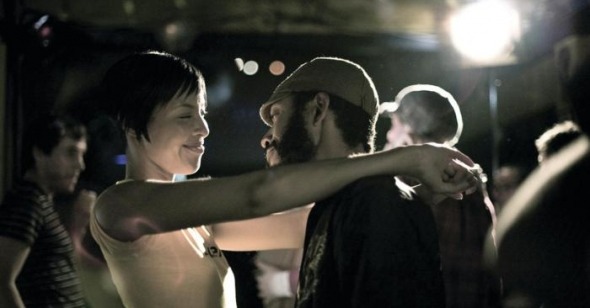Living for the City
by Michael Koresky
Medicine for Melancholy
Dir. Barry Jenkins, U.S., IFC Films
The structure of Barry Jenkins‚Äôs Medicine for Melancholy allows for a terrific twist right off the bat. Like many other modestly budgeted American indies, Jenkins‚Äôs film follows two people getting to know each other, as they wander an expressive cityscape, over the course of one day‚ÄĒaloofness gives way to intimacy, flirtation transitions into intellectual probing, daytime turns to night. The major difference here lies in the deployment sexual tension: this man and this woman aren‚Äôt looking to sex as the endpoint, for this day is already the aftermath of an anonymous one-night-stand. The goal, as it were, has already been met; now if they can let their defenses down there can be a more pure meeting of the minds.
It’s a neat trick that Jenkins’s feature debut begins the morning after. All we initially see of twentysomething Micah (Wyatt Cenac) and Joanne (Tracey Heggins) is some awkward stumbling amidst unforgiving dawn light: brushing teeth with fingers, a glaring lack of conversation as they pull themselves together. Not even aware of each other’s names yet, the two hurry out of the spacious, San Francisco mod loft they have crashed in, one which belongs to a friend, or perhaps just an acquaintance. It’s the first of three interior living spaces Micah and Joanne will occupy throughout the course of Jenkins’s film, each growing progressively smaller. Introducing these two, perhaps lost, young people within this anonymous apartment is an appropriate way to begin a story that’s as much about spaces and urban dwelling as it is about those who inhabit them.
With its crisp digital texture and desaturated aesthetic, which often makes the whole image nearly black-and-white save for bursts of pink and red (in shirts, flowers, lights), Medicine for Melancholy aims initially for an emotional detachment that mirrors the standoffishness of Joanne, who at first bristles at Micah‚Äôs every attempt at conversation, even a simple ‚ÄúWhat do you do?‚ÄĚ After Joanne (nicknamed Jo) and Micah (don‚Äôt call him Mike) learn each other‚Äôs names, he tries to move to a more traditional male courting routine, which she tries to reject: it turns out she has a boyfriend, marking the previous night‚Äôs activities suddenly illicit and regrettable. But then, after stacking the deck in this fashion, and painting Jo as sensibly icy, Jenkins has her melt a little too easily‚ÄĒit‚Äôs hard to believe that all it would take to charm such a seemingly no-nonsense woman would be a little guitar strumming of the Mister Rogers theme and a hastily assembled, childlike drawing, but Micah‚Äôs gifts prove adorable. It‚Äôs the first false note in a film that‚Äôs mostly discriminating in its accruing of little moments and gestures, and which fights, often successfully, with its own penchant for broadness.
In his early attempts at getting Jo to spend her lazy Sunday with him, Micah, who later will drunkenly rant against the co-opting of the term ‚Äúindie‚ÄĚ for a strictly white culture, seems suspiciously like many a self-consciously hip male protagonist from recent low-budget American rom-coms, from Funny Ha-Ha to Quiet City. Thankfully, Medicine for Melancholy‚Äės scope grows wider: for Jenkins‚Äôs film refreshingly uses the indie romance template as an excuse for an investigation into African-American identity. ‚ÄúHow do you define yourself?‚ÄĚ Micah asks Jo, and it‚Äôs a can of worms that the rest of the film refuses to close. Micah, a perturbed observer of San Francisco‚Äôs gentrification, is chagrined that Jo‚Äôs boyfriend is white; Jo refuses to label herself. He resents her casual recession into the pervasive white culture; she is uncomfortable with what she sees as a predictable black-male militancy. All the while, their attraction begins to grow again. Whether they ‚Äúlearn‚ÄĚ from each other over the course of the day is thankfully left up to the viewer to decide.
In its delicate, hushed shooting style (save for one moment where the camera whips and circles around Micah for no discernible reason) and unforced, natural performances, Medicine for Melancholy ultimately recalls the underrated recent American independent character study Ciao rather than the work of directors like Aaron Katz or Joe Swanberg; here awkwardness seems to come from the characters’ true neuroses more than from self-conscious mannerism. And, paradoxically, at its most narratively ungainly moment, when the movie stops dead so that Micah and Jo can listen to a San Francisco housing-rights committee conversation that they have just happened upon (they are basically spouting the film’s underlying themes of gentrification and rising property value), Melancholy emotionally comes together. The film proves itself wonderfully willing to move outside of itself, and its cute couple, and take a look at the bigger picture.
